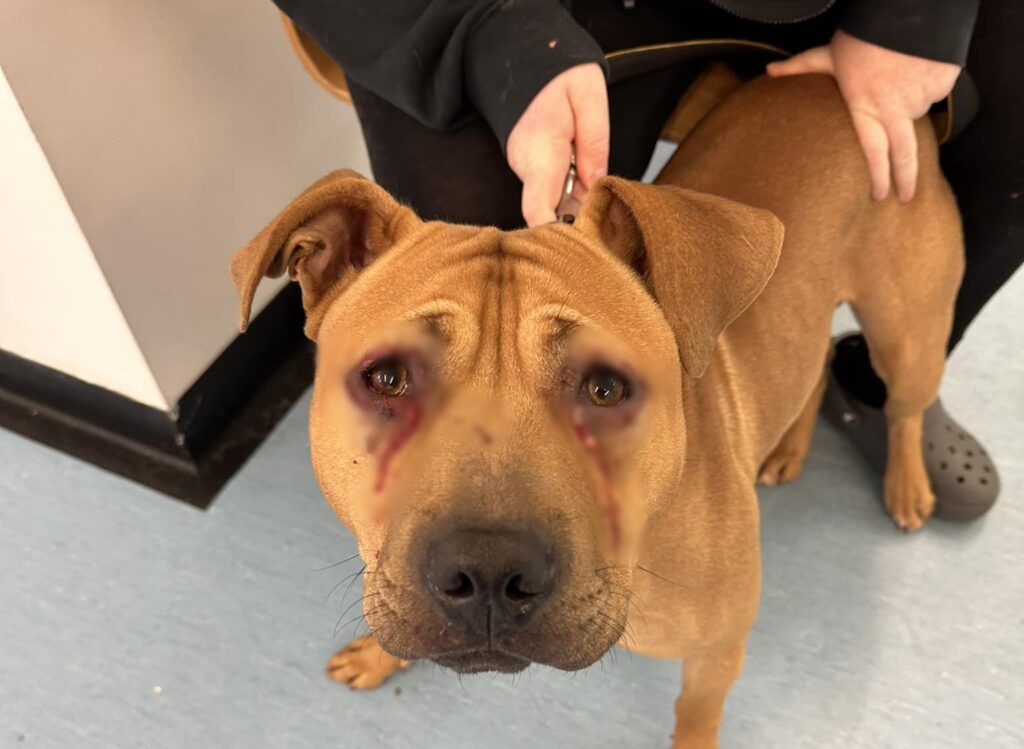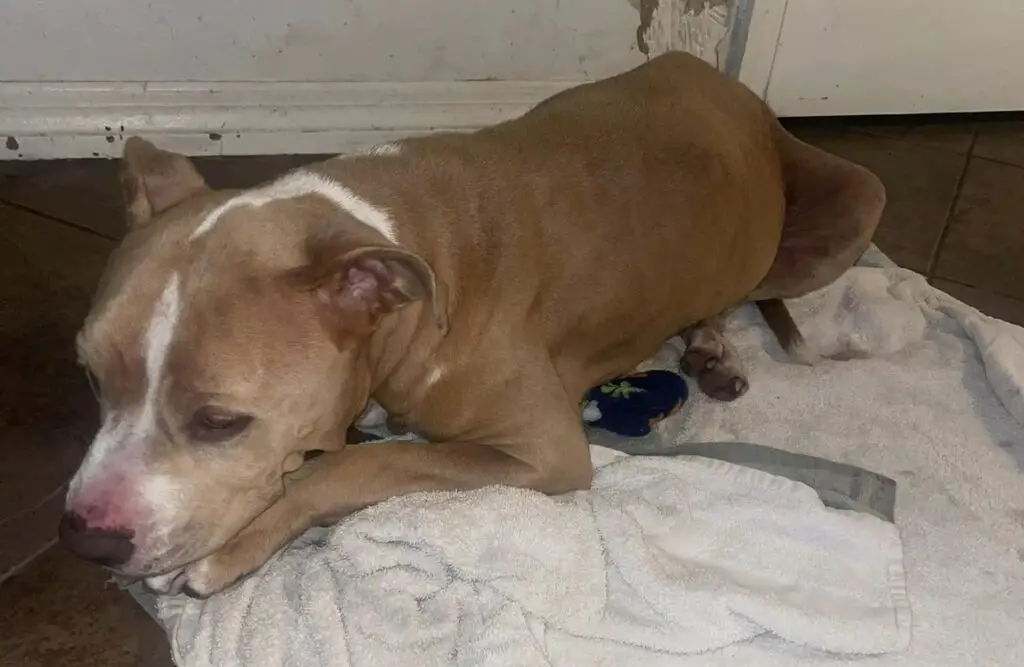Many pet parents are worried about their dog’s lymph node bursting. While they are right to be concerned, not all lymph nodes are going to burst.
In this blog post, we will be discussing the possibility of a dog’s lymph node rupturing. We will be exploring what could cause such an occurrence and how it can be prevented.
Additionally, we will also discuss the symptoms and treatment for a ruptured lymph node in a dog.
- Key Takeaway
- Can A Dog Lymph Node Burst?
- What Causes a Dog Lymph Node To Burst
- What To Do If a Dog Lymph Node Bursts
- How To Prevent a Lymph Node From Bursting?
- Can A Dog Lymph Node Bleed?
- Can A Dog Lymph Node Be Popped?
- Can You Irritate a Lymph Node By Touching It?
- FAQs
- Q: What are the causes of swollen lymph nodes in dogs?
- Q: What are the signs of lymph node enlargement in dogs?
- Q: Can an enlarged lymph node in a dog be cancerous?
- Q: How are swollen lymph nodes in dogs diagnosed?
- Q: What are the treatment options for swollen lymph nodes in dogs?
- Q: Can swollen lymph nodes in dogs resolve on their own?
- Q: Are certain dog breeds more prone to swollen lymph nodes?
- Q: Can swollen lymph nodes in dogs spontaneously rupture?
- Q: What is the first sign of lymph node enlargement in dogs?
- In Conclusion
Key Takeaway
- A dog’s lymph node can burst if it becomes overly swollen due to conditions like infections, trauma, or cancer, and this is a serious situation that requires immediate veterinary attention.
- A dog’s lymph node can burst due to severe swelling, often caused by conditions like infections, trauma, or certain types of cancer.
- If a dog’s lymph node bursts, it is critical to seek immediate veterinary attention to prevent infection and provide appropriate treatment for the underlying cause.
Can A Dog Lymph Node Burst?

Yes, a dog’s lymph node can burst, particularly if it becomes significantly swollen or infected.
This is more common in the groin area and can cause permanent scarring and severe pain.
In some cases, such as a condition known as “puppy strangles,” the lymph nodes on either side of a dog’s neck may become so tender and swollen that they eventually rupture.
It’s important to note that a ruptured lymph node can lead to serious complications and immediate veterinary care is required.
See also: Can Dogs Lymph Nodes Swell After Surgery?
What Causes a Dog Lymph Node To Burst

- Infections: Bacterial or fungal infections can cause lymph nodes to swell and potentially burst if left untreated.
- Abscesses: An abscess, a localized collection of pus, can form within a lymph node, leading to swelling and potential rupture.
- Cancer: Certain types of cancer, such as lymphoma, can cause the lymph nodes to enlarge and could lead to rupture.
- Inflammatory conditions: Certain inflammatory conditions, like lupus, can cause swollen lymph nodes that may rupture.
- Trauma: Physical injury to the area around a lymph node can cause it to swell and possibly burst.
- Neglected care: If swollen lymph nodes are not treated promptly, they can become so enlarged that they rupture.
See also: What Is a Reactive Lymph Node In Dogs?
What To Do If a Dog Lymph Node Bursts
Here is what to do if your dog’s lymph node bursts:
Immediate Action
If a dog’s lymph node bursts, the first course of action should be to contact your vet immediately. This is a serious condition that requires immediate medical attention.
Medical Treatment
The vet will likely perform a physical examination to determine the extent of the damage and the cause of the rupture. In some cases, they may need to surgically remove the entire node to prevent further complications. If an infection is present, antibiotics will be administered.
Ongoing Care
After the initial treatment, ongoing care is necessary to ensure recovery. This might include administering prescribed medication, keeping the area clean, and regularly monitoring the dog’s condition.
Prevention
Preventing lymph node rupture involves early detection and treatment of conditions that cause swollen lymph nodes. Regular veterinary check-ups can help detect issues like infections or cancer early on, improving the effectiveness of treatments and overall prognosis.
See also: What Do Dog Lymph Nodes Feel Like?
How To Prevent a Lymph Node From Bursting?
- Regular Vet Check-ups: Regular veterinary check-ups can help detect issues like infections or cancer early on, improving the effectiveness of treatments and overall prognosis.
- Healthy Diet: Feeding your dog a balanced, nutritious diet can help maintain their overall health and boost their immune system, reducing the likelihood of infections that could cause lymph node swelling.
- Maintain Hygiene: Keeping your dog clean, especially after outdoor activities, can prevent bacterial and fungal infections that may cause the lymph nodes to swell.
- Prompt Treatment: If your dog has swollen lymph nodes, seek immediate veterinary care. Early treatment can prevent complications such as rupture.
- Monitor Physical Changes: Regularly check your dog’s body for lumps, bumps, or other abnormalities. If you notice any changes, contact your vet immediately.
- Vaccinations: Ensure your dog is up-to-date with all necessary vaccinations to prevent diseases that could potentially lead to swollen lymph nodes.
- Regular Exercise: Regular exercise helps to keep your dog’s body functions running smoothly and boosts the immune system, which can help to prevent conditions that cause lymph node swelling.
See also: Can Dogs Live Without Lymph Nodes?
Can A Dog Lymph Node Bleed?
Yes, a dog’s lymph node can bleed, particularly under certain conditions. For instance, malignant skin cancers such as mast cell tumors in dogs can be superficial lumps that often swell and frequently bleed, then scab over, only to bleed again a few days later.
In addition, dogs with lymphoma, especially affecting the gums, nose, or lip margins, may experience areas that become ulcerated (break open) and bleed or form crusts.
Furthermore, in dogs with juvenile cellulitis, the submandibular lymph nodes (located on either side of the neck, under the jaw) often become swollen and tender.
As the disease progresses, these lymph nodes may rupture and drain, leading to potential bleeding.
See also: Can Dog Lymph Nodes Be Removed?
Can A Dog Lymph Node Be Popped?
No, a dog’s lymph node should not be popped. Attempting to squeeze, drain, or puncture swollen lymph nodes can cause further irritation and inflammation, push any existing infection deeper into the skin, or cause severe bleeding.
It is important to seek veterinary care if you notice your dog has swollen lymph nodes.
Treatment varies depending on the cause of the swelling and may include medications such as steroids, anti-inflammatories, antibiotics, and anti-parasitics, or in some cases, surgery or radiation.
Can You Irritate a Lymph Node By Touching It?
Yes, you can irritate a lymph node by touching it. Frequent poking and squeezing of lymph nodes may keep them from shrinking back to normal size.
In fact, they might not completely disappear even after a month. Over-touching or pressing lymph nodes can cause them to become inflamed and somewhat enlarged.
It’s also worth noting that unnecessary pressing, squeezing, draining, or puncturing can potentially irritate or inflame the lymph nodes, push any existing infection deeper into the skin, or cause severe bleeding.
FAQs
Q: What are the causes of swollen lymph nodes in dogs?
A: Swollen lymph nodes in dogs can be caused by various factors. Some common causes include infection, inflammation, cancer (such as lymphoma), immune system disorders, and certain medications.
Q: What are the signs of lymph node enlargement in dogs?
A: The signs of lymph node enlargement in dogs may vary depending on the underlying cause. However, some common signs include the presence of one or more swollen lymph nodes, pain or discomfort in the affected area, fever, loss of appetite, lethargy, and changes in behavior.
Q: Can an enlarged lymph node in a dog be cancerous?
A: Yes, an enlarged lymph node in a dog can be cancerous. Lymphoma, a type of cancer that affects the lymphatic system, is one of the common causes of lymph node enlargement in dogs. It is important to consult with a veterinarian for proper diagnosis and treatment.
Q: How are swollen lymph nodes in dogs diagnosed?
A: Swollen lymph nodes in dogs can be diagnosed through various methods. A veterinarian will typically perform a thorough physical examination, including palpation of the lymph nodes. Additional diagnostic tests, such as blood tests, biopsies, or imaging studies, may be recommended depending on the suspected underlying cause.
Q: What are the treatment options for swollen lymph nodes in dogs?
A: The treatment options for swollen lymph nodes in dogs will depend on the underlying cause. In some cases, if the swelling is due to an infection, antibiotics may be prescribed. For cancerous lymph nodes, treatment may involve chemotherapy, radiation therapy, or surgery. It is crucial to consult with a veterinarian for proper diagnosis and treatment recommendations.
Q: Can swollen lymph nodes in dogs resolve on their own?
A: Swollen lymph nodes in dogs may resolve on their own if the underlying cause is a minor infection that the dog’s immune system can fight off. However, it is important not to rely solely on self-resolution and to seek veterinary advice to determine the cause and appropriate treatment.
Q: Are certain dog breeds more prone to swollen lymph nodes?
A: While swollen lymph nodes can occur in any dog breed, certain breeds, such as Golden Retrievers, have been found to have a higher predisposition to certain types of lymphoma which can cause lymph node enlargement. It is always a good idea to monitor your dog’s health and seek veterinary attention if you notice any concerns.
Q: Can swollen lymph nodes in dogs spontaneously rupture?
A: Swollen lymph nodes in dogs can potentially rupture, but this is typically rare. Rupture may occur if the lymph node becomes excessively enlarged and the pressure inside the node increases. However, this is not a common occurrence and should be evaluated by a veterinarian.
Q: What is the first sign of lymph node enlargement in dogs?
A: The first sign of lymph node enlargement in dogs is typically the presence of one or more swollen lymph nodes. These nodes may be noticeable through touch or visible swelling on the body. It is important to keep an eye on any changes in your dog’s lymph nodes and seek veterinary advice if you have concerns.
In Conclusion
In conclusion, a dog’s lymph node can burst due to various causes, such as infections or tumors.
While this is an uncommon event, it is important for pet owners to be aware of the potential risks and symptoms associated with a ruptured lymph node.





Leave a Reply